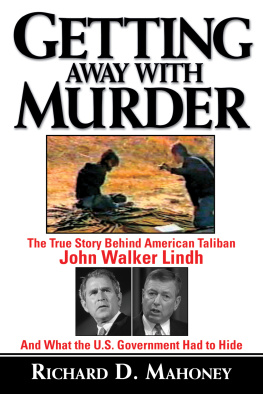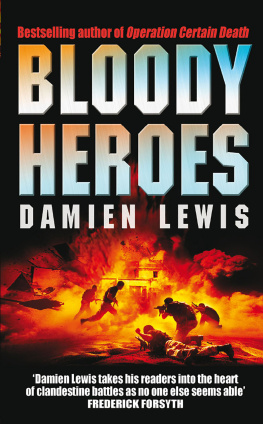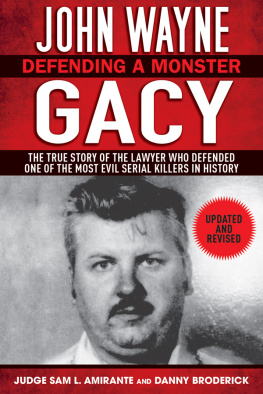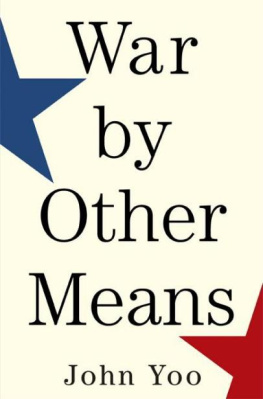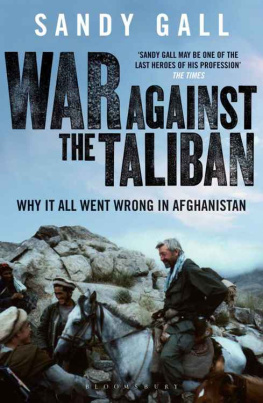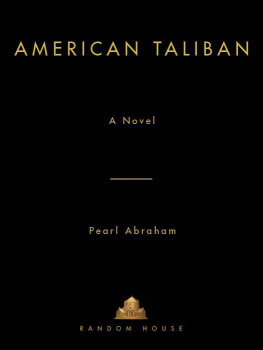GETTING
AWAY WITH
MURDER
Also by Richard D. Mahoney
The Kennedy Brothers
GETTING
AWAY WITH
MURDER
The True Story Behind American Taliban
John Walker Lindh
And What the U.S. Government Had to Hide
RICHARD D. MAHQNEY

Copyright 2004, 2011 by Richard D. Mahoney
All Rights Reserved. No part of this book may be reproduced in any manner without the express written consent of the publisher, except in the case of brief excerpts in critical reviews or articles. All inquiries should be addressed to Arcade Publishing, 307 West 36th Street, 11th Floor, New York, NY 10018.
Arcade Publishing books may be purchased in bulk at special discounts for sales promotion, corporate gifts, fund-raising, or educational purposes. Special editions can also be created to specifications. For details, contact the Special Sales Department, Arcade Publishing, 307 West 36th Street, 11th Floor, New York, NY 10018 or info@skyhorsepublishing.com .
Arcade Publishing is a registered trademark of Skyhorse Publishing, Inc., a Delaware corporation.
Visit our website at www.arcadepub.com .
10 9 8 7 6 5 4 3 2 1
Library of Congress Cataloging-in-Publication Data is available on file.
ISBN: 978-1-61145-317-1
Printed in the United States of America
For Alice Doyle Mahoney with love
He that walketh with wise men shall be wise; but a companion of fools shall be destroyed.
Proverbs 13:20
1987 Winfield City High School yearbook,
dedication of Johnny Micheal Spann
My passion holds all my wealth and all my liabilities. It is my identity. Alas, I know of no more noble cause than to fight for that which one has the greatest passion for. Rebellion left in the hands of good men will ultimately prevail.
FBI special agent John O'Neill,
letter to a friend
The Messenger of Allah, may peace be upon him, was asked: What deed could be an equivalent to Jihad in the way of Allah, the Almighty and Merciful? He answered: You do not have the strength to do that deed.
Hadith, quoted by John Walker Lindh,
e-mail from Yemen, February 24, 2000
CONTENTS
ACKNOWLEDGMENTS
T his book was built on the strength of friends, old and new. My friend Tim Bent had the idea of a book about the encounter between Johnny Micheal Spann and John Walker Lindh in the seconds before the bloody uprising in the prison courtyard of the Qala-e Janghi fortress. I wonder what they said to each other? Bent wondered over the phone one winter day in early 2003. How they got there? How Spann really died? I took some notes and set off on an uncharted journey.
My mother, Alice D. Mahoney, found the enterprise sufficiently interesting to read the first rough drafts and listen to my stories from the road. Three of my sisters, Sheila Patton, Noel Shambayati, and Eileen Mahoney, provided timely encouragement and valuable suggestions. My aunt Brenda Jeffers was the first to read my book proposal, and my uncle Peter Doyle was the first to see the final manuscript.
Donavon Ostrom, who has critiqued my previous histories, soldiered through this one as well. Carlotta Gall and Neil A. Lewis of the New York Times were kind enough to take the time to open up a couple of critical doors. Marcela Gaviria, a director and producer at Rain Media, set me up with people in Peshawar and Kabul. Anil Mehrota provided insight and material on the Pakistani connection. Toward the end of the road, I was graced to meet up by chance with an old friend, Williamette Law School professor Robin Morris Collin, who reviewed the book's final chapters. Without the resolute generosity of Johnny Spann, Mike Spann's father, this book would have lacked the true shades of its American hero. United States senator Richard C. Shelby (R-Ala.), New School president (and former U.S. senator) Bob Kerrey, and Colorado College president (and former U.S. ambassador to India) Richard E Celeste each gave me their judgments and thereby helped shape the book's conclusions. I should also thank Army Colonel (ret.) W Patrick Lang, the former director of human intelligence collection at the Defense Intelligence Agency, and Air Force It. col. (ret.) Richard Francona, another lucid Arabist at DIA, for sharing their deep understanding of the application of intelligence to national security. My old classmate at the Johns Hopkins University School of Advanced International Studies, Dr. Tim Lomperis, instructed me about the extraordinary joint venture between the CIA and the Special Forces in military interventions from Vietnam to present.
Bill West, the mayor of Winfield, Alabama, and a friend of the Spann family, deserves grateful mention for guiding me through the town's unique history as well as introducing me to some of Mike Spann's former teachers. At Fort Bragg, the Green Berets I interviewed were generous in detailing their October-November 2001 operations in northeastern Afghanistan as well as describing their association with Mike Spann. Jack, a former Green Beret who served as a military adviser to the United Front in the offensive against Al-Qaeda and the Taliban, deserves special mention for his candor and contribution. I owe a debt as well to Chris Thompson, whose scholarship on the role of the Special Forces in Afghanistan is exceptionally deep. He answered all of my many questions and opened up a few doors as well.
In the course of retracing Mike Spann's years in the United States Marine Corps, I visited Camp Lejeune where he had served in the 2nd ANGLICO. Spann's buddy, former Marine captain Michael Tapen, flew out to join me in my tour and proved indispensable in setting the scene and sharing his reminiscences. 1st Lt. Marisol Cantou was our capable guide on and off base. Two of Spann's other friends in the Corps, Lt. Col. Justin Orabona and Major Tray Ardese, also deserve grateful mention.
Without Mark Kukis's outstanding book on John Walker Lindh, My Heart Became Attached, this book would have lacked detail and perspective regarding Lindh's strange and fateful odyssey. Four members of Lindh's defense team kindly answered questions in interview and later in e-mail. Dr. Tamara Sonn, a brilliant Islamicist who spoke at length with Lindh after his capture, was especially beneficent in her reflections.
Early on in my labors to piece together what really happened in that prison courtyard on the morning of November 25,2001,1 came to the realization that the intersection of Mike Spann and John Walker Lindh derived from a road not taken prior to 9/11that of interdicting Al-Qaeda terrorists before they ever struck. One man seemed to embody not only warnings of that contingency but knowledge of Washington's corrupt inner dealings with two terrorist states thought to be American allies, Saudi Arabia and Pakistan. The story of FBI special agent John O'Neill provides a bridge for understanding what went wrong prior to 9/11 and has since. O'Neill's close friend and fellow special agent Wesley Wong was particularly frank and provident. As in my previous books in biography and foreign policy, I have adopted the practice in certain instances of maintaining confidentiality of source in this book, especially with regard to current and former special agents in the FBI, CIA officers, and key respondents in Pakistan and Afghanistan whose personal security might well be compromised if there were specific citation.
In the end, when it came time to complete the manuscript, as opposed to go back on the road again, old friends came through. Two of my former students, Brian Hirsch and Navin Gupta, pitched in, as did Teresa and Scooter Molander, Steve Brittle, SamVagenas, Mary Maffeo, Gene and janey Fisher, and Mary Mahoney. Lisa Von Bargen, who signed on as my research assistant in May 2003, proved to be a great deal more than that in the last push toward the finish line. Without the steady support of my wife, Karen Longo, who cast a discerning eye on the results of my efforts throughout, I would not have completed the job.
Next page
